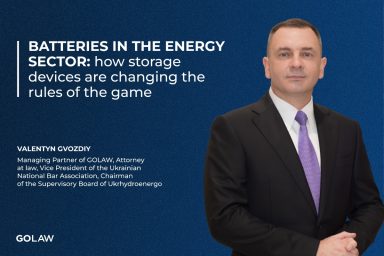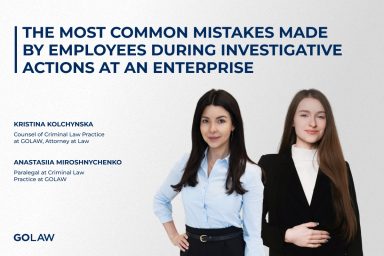Changes to PPA: to make financiers happy
Contents
Over the last few months before January 2018, when the latest changes to the power purchase agreements (PPAs) between State Enterprise “Energorynok” and producers of energy from alternative sources were adopted, more than ten agreements were signed with upgraded conditions set earlier in 2017. Nevertheless, the revised PPAs still have a lot of issues that need to be clarified and further elaborated to make them properly executable.
More options for producers
The changes primarily affected the procedure for terminating a PPA. Previously, PPAs could only be terminated by the mutual, written consent of the parties, or by a putting into effect a court decision. The latest amendments imply that producers have the right to terminate a PPA at their own initiative under certain circumstances, while also having the possibility to seek compensation from State Enterprise “Energorynok” in such cases. Among such circumstances are: the insolvency or liquidation of State Enterprise “Energorynok” or the appointment of a liquidator for it; delays in payments of more than 90 calendar days; any other breach of substantial obligations by the purchaser for more than 120 calendar days; the impossibility to recognize or enforce in Ukraine an international arbitration decision in the producer’s favor; or the failure of the parties to introduce changes to a PPA due to changes in the applicable law.
Direct agreements with creditors
The producer’s right to terminate a PPA does not quite correlate with another amendment – the right of State Enterprise “Energorynok” to enter into direct agreements with creditors to finance a producer’s projects. In this case, the producer’s consent for the conclusion of such direct contracts is not required. A clause that should be obligatory for inclusion in each agreement with creditors is that State Enterprise “Energorynok” is obliged not to terminate a PPA for 120 days after written notification from creditors (or their agents) of the purchaser’s intent to terminate the PPA due to a breach by the producer of its obligations under the PPA. This does not give a clear view of how a PPA should be terminated if a producer breaches its obligations: according to the clause on termination, the agreement shall be terminated only by mutual written consent of parties or under a court ruling. At the same time, according to clause on direct agreements with creditors, it can also be terminated at the initiative of State Enterprise “Energorynok”.
Not everyone can be a creditor
Another interesting issue is how amendments define the meaning of term “creditors” for the purposes of a PPA. According to the definition, the EBRD, IFC, World Bank, OPIC and other similar international financial institutions are considered to be the only possible creditors who can enter into direct agreements with purchasers. This clause excludes not only all potential national creditors, but also leaves producers without the opportunity to pay back debts to national creditors in the case of the termination of a PPA at the producer’s initiative.
Hard-to-get compensation
The new version of a PPA provides producers with the right to seek compensation if the agreement is terminated at their initiative. The amount of compensation shall include, among other things, the principal amount of the loan, as well as interest accrued on it, to all creditors as they are defined in the PPA. However, the sum of debt
to national creditors cannot be compensated for under such a clause. Another important issue regarding the producer’s right to seek compensation is that such compensation can be considered as state aid according to the Law of Ukraine “On State Aid for the Business Entities.” For providers, this means that chance of getting compensation provided by the PPA depends entirely on the will of the Antimonopoly Committee of Ukraine as the state body authorized to approve and monitor all kinds of state aid. The process of approval by the AMCU takes from three to six months, which significantly slows down and complicates the whole procedure of getting compensation paid. Besides that, the AMCU has the right to cancel a previously issued approval at any moment, and to issue a conclusion on the inadmissibility of paying compensation, so producers can never be sure if they will get the compensation in full – even if approval has already been issued.
Disputes can be different
The new version of PPA sets out different approaches to the dispute resolution procedure depending on the type of the producer. Thus, if a producer is an enterprise with foreign investments as defined under Ukrainian law, any dispute shall be resolved at the discretion of the producer, within the jurisdiction of ICC arbitration by three arbitrators, or in a commercial court of Ukraine. If producer is not an enterprise with foreign investments – the only possible method of dispute resolution is a court trial in the corresponding commercial court of Ukraine. Such a provision severely limits litigation options for enterprises without foreign investment, and could even be considered discriminatory. As mentioned above, in such a case the producer has the right to terminate a PPA at his own initiative, but does not yet have the right to apply to a Ukrainian court on this issue – which is quite a deadlocked situation that the regulator has not managed to settle. The government has taken an important step forward in upgrading PPAs, along with guiding the implementation of legislation, and by inviting public comment on the framework. Adapting Ukrainian PPAs to international market standards to ensure bankability and clarifying the scope for a government guarantee of Energorynok’s obligations as a purchaser is a major breakthrough.
While in 2017 foreign investors were just looking at Ukrainian projects and waiting for the amendments to PPAs, in 2018 we are already witnessing the more active implementation of such projects.

Sergiy Oberkovych
Senior Partner, Attorney at law
- Contacts
- 31/33 Kniaziv Ostrozkykh St, Zorianyi Business Center, Kyiv, Ukraine, 01010
- s.oberkovych@golaw.ua
- +380 44 581 1220
- Recognitions
- The Legal 500 EMEA 2023
- Who’s Who Legal 2022
- Lexology Index: Corporate Tax 2024
Related insights

01 July 2025 Energy Alert
Batteries in the energy sector: how storage devices are changing the rules of th...

30 June 2025 Publication
The most common mistakes made by employees during investigative actions at an en...

27 June 2025 Publication
The future of сryptocurrencies in Ukraine: what virtual asset holders should pre...
Sign up to be aware
New achievements are inspired by information. GO further, don’t miss out GOLAW news and legal alerts
Our expertise
-
- Antitrust and Competition
- Banking and Finance
- Compliance, Corporate Governance and Risk Management
- Corporate and M&A
- Criminal and White Collar Defence
- Defense in Anti-corruption procedures and regulations
- Labor and Employment
- Natural Resources and Environment
- Government Relations (GR)
- Insolvency and Corporate Recovery
- Intellectual property
- International trade
- Legal support of business and private Сlients in Germany
- Litigation and dispute resolution
- Private clients
- Real Estate and Construction
- Energy and Natural Resources
- Restructuring, Claims and Recoveries
- Martial Law
- Tax and Customs
-
- Agribusiness
- Aviation
- Chemical industry
- Engineering, Construction and Building Materials
- Natural Resources and Environment
- Financial institutions
- IT and AI
- Industry and manufacturing
- Healthcare industries, Life sciences and Pharmaceuticals
- Media, Entertainment, Sports and Gambling
- Retail, FMCG and E-Commerce
- Transport and Logistics
We use cookies to improve performance of our website and your user experience.
Cookies policy
Cookies settings




